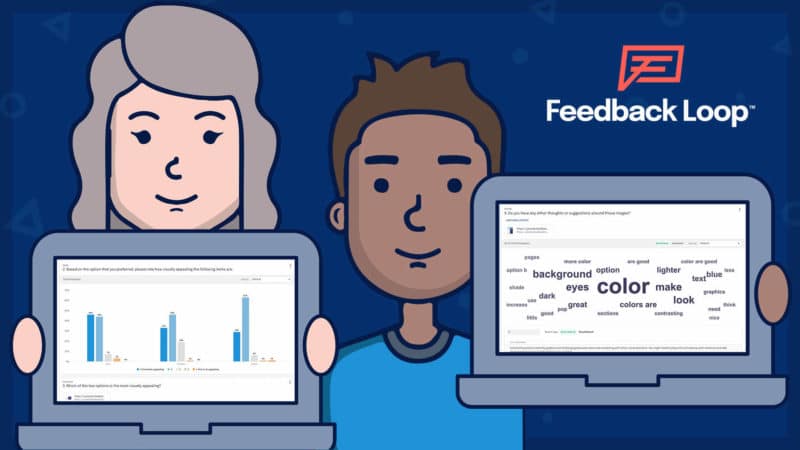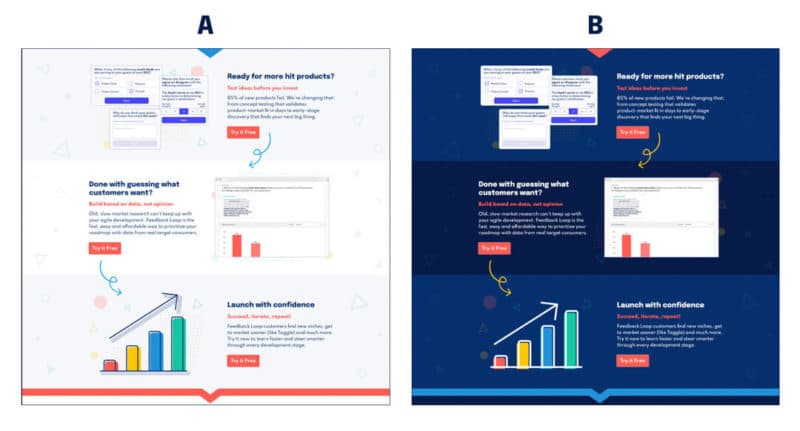
We’re told hindsight is 20/20. But hindsight doesn’t always tell you where you need to go. In fact, when it comes to research, it only tells you where you’ve been. On the other hand, Foresight research tells you where you need to go, sets you on the right path, and lets you continually check-in to make sure you are always headed in the right direction.
“Foresight research allows you to get quick feedback about what your customers want right now,” Feedback Loop CEO Rob Holland said. “It gives you the ability to rapidly innovate, test a hypothesis, get feedback, make another decision, test that decision, get more feedback, and do that all very, very quickly, so you can stay on track.”
Marketers looking to plan their next ad, message or campaign traditionally have relied on hindsight, or legacy, research. They look at how things have performed in the past to inform what they do in the future. But traditional legacy research is expensive and time-consuming, and it gives you a snapshot of just one moment in time, which by the way, is already behind you. It may have little to do with what’s in front of you.
We know of what we speak. Feedback Loop’s crackerjack marketers recently undertook a revamp of our digital presence. As the effectiveness of agile, iterative, foresight research for marketing became crystal clear, so did the tangible results of our campaigns.
“We would’ve been completely wrong.”
Jolene Pierangeli was surprised. A seasoned marketing consultant, she was charged with overseeing Feedback Loop’s marketing changes. As was her usual practice, she looked at previous ad campaign history and website traffic to gather data to use in planning the company’s website redux.
“Typically, in marketing, you look at how banner ads or display ads perform in other locations,” Pierangeli said. “You take into account personas and the demographics for your audience. Then you use that data to make assumptions and decisions based on what you know — but that legacy data isn’t necessarily right.”
Feedback Loop exists to provide rapid consumer feedback, so Pierangeli didn’t have to rely solely on that legacy data. She did what Feedback Loop tells its clients to do: She tested.
Marketing designer Michelle Baker created mock-ups of two new website designs. Option A had a clean white background, using graphics to add some color. Option B had blue elements and a darker blue background. Based on the legacy data they had, as well as the popularity of white-background websites, Pierangeli and Baker were certain their audience would prefer Option A. They did an A/B test using the Feedback Loop platform.
To their surprise, respondents favored Option B.


In addition to testing the color, layout, and user experience for the website, they tested whether to use clickable dropdowns, so all text information would be accessed by clicking buttons.
“Personally, I like to interact with websites that way, and I thought other people would, too,” Baker said. They used the Feedback Loop platform to test their hypothesis that users would prefer a cleaner experience that would encourage them to click through to get the specific information they wanted.
Again, Pierangeli and Baker were surprised. The overwhelming response to the test was that users wanted everything to show at once — no clicks needed — because they didn’t want to have to do any extra work to get information.

“That was not a behavior or a response we thought we were going to have,” Pierangeli said. “I realized you can use as much data as you want from previous campaigns, but you’re going to be missing out on what consumers actually want. In our case, we want product professionals, marketing professionals, research professionals, UX, and innovation teams to find the website useful and easy to navigate.
“All the data we had from other channels and the historical information — from a few months ago to a few years ago — did not tell us this. We didn’t learn this until we tested the different layouts, the different colors, the different ways text was presented. I was surprised. I’ve been doing this for a long time — a really long time — so you’d think I’d have a fairly decent understanding of what consumers would want. I have an understanding of target personas and what’s important to them. That’s why we do persona exercises. But without using Feedback Loop, we would’ve been completely wrong.”
The new blue website launched on February 14, 2022. Since then, Feedback Loop has seen traffic increase — and that doesn’t even include repeat users. The number of new website visitors doubled.
“In a week, we got a month’s worth of lead guarantee.”
On the heels of the website’s success, Feedback Loop launched a content syndication program. The company handling the promotion said it should take a month to reach Feedback Loop’s guaranteed lead goal.
Before launching the promotional ad, Pierangeli and Baker tested the advertising and messaging for their promotion using the Feedback Loop platform. For the ad, targeted at both marketers and product teams, Baker created one version using a cartoon treatment and one using screenshots. The majority of the audience-tested chose the screenshot version. That’s the one they launched.
Feedback Loop got their entire lead guarantee in one week.
“In a week, we got a month’s worth of lead guarantee, which is great because that gave us the entire month to nurture them. We were able to use the time we saved by testing to nurture those leads and then start converting them,” Pierangeli said. They’ve converted 30% of those leads to MQL — so far.
For the next iteration of the ad, targeted at marketers, Baker tested three concepts with the Feedback Loop platform: one with cartoons, one with screenshots, and one with a combination of both. The third option — a combination of styles — was chosen by 46% of respondents, so that’s the ad they’ll be launching.

“As a designer, before I started testing concepts, I never really knew how an audience would react to what I was creating,” Baker said. “Using the Feedback Loop platform lets us target exactly who we want to target, and the more data we have, the better the end results will be. Now, when I create something, going in blind is pointless since I have the ability to know what the audience prefers before we ever launch.”
“You already know going into it what your consumers want.”
The lessons she learned by using Feedback Loop for Feedback Loop changed how Pierangeli looks at marketing campaigns.
“When marketers build out a campaign plan, they typically build out a first draft, revision time, second draft, final draft, then launch date,” she said. “Unfortunately, a lot of times after a launch, the campaign does not perform and deliver the number of leads or MQLs or conversions to opportunities that marketing needs to build the lead funnel and help sales convert. That means marketing will have to go back and add new content to their campaign or do other types of activities. Basically, they’ll have to do more work in order to get to their goal.”
By building rapid consumer research into marketing processes early on, marketers can save themselves and their teams hours of work down the road and, potentially, prevent failure of a launch. Testing in the Feedback Loop platform only takes a couple of hours, and it can de-risk decisions, whether it’s what color to put on your website or what messaging to use for a promotion. You don’t have to wait weeks or months for traditional research methods to produce insights that are already in hindsight when you finally get them. A little foresight goes a long way toward ensuring you launch successfully.
“You need to bring in the voice of your consumers to have true data to make your marketing campaign successful,” Pierangeli said. “Then you can launch with confidence and know you’re going to get what you’re trying to get, whether it’s a number of leads or delighting your customers or a higher conversion rate. For all the things you are being held accountable for, you improve your chances of success by testing in advance.
“It’s OK to be wrong. But you need to understand that, even though you may have been doing this for years, even though you may have the most well-written persona until you actually ask your potential customers what it is they want, you really don’t know.”
Still skeptical? Don’t take our word for it, try Feedback Loop yourself for FREE!
The post Don’t miss out on what your customers actually want appeared first on Search Engine Land.
No comments:
Post a Comment